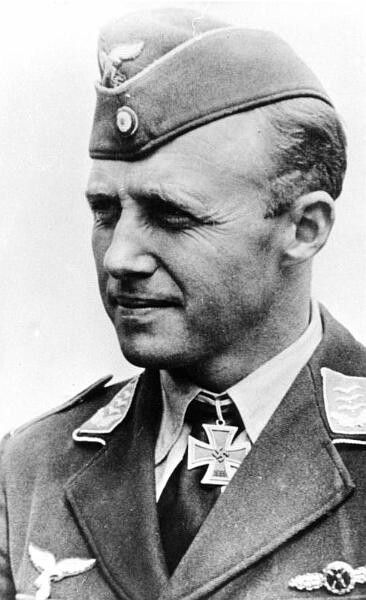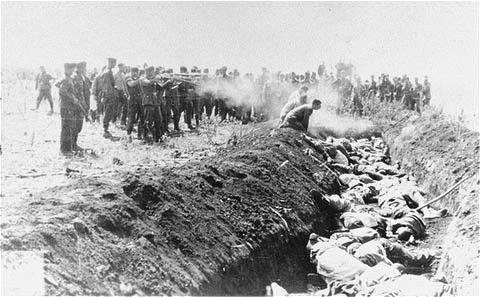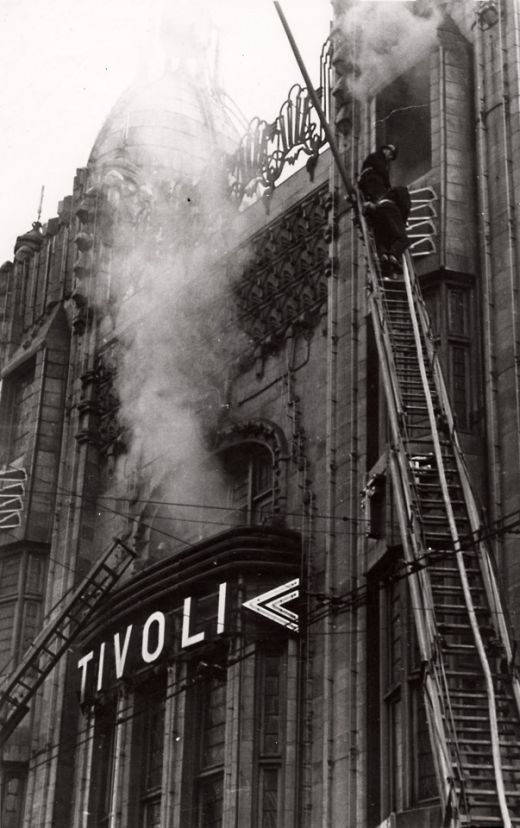Friday 18 July 1941
 |
| German soldiers taking down a Soviet Red Star somewhere in Russia, 18 July 1941. |
In the Army Group North sector, General Erich von Manstein's LVI Army Corps withstands a determined Soviet counterattack by Soviet 11th Army and 27th Army, with part of Manstein's force escaping from encirclement. The German 8th Panzer Division is mauled, and Manstein's force loses a large portion of its striking power.
In the Army Group Center sector, Panzer Groups 2 and 3 continue moving toward each other east of Smolensk. Today, they advance to within 16 km (9.9 miles) of each other. The laggard is General Hoth's Panzer Group 3, which is struggling with the swampy terrain that has been swollen due to recent rains. Soviet resistance also has strengthened, as the Kremlin now realizes the danger - the Soviets have hundreds of thousands of troops around Smolensk - and are pulling troops out of the closing pocket and placing them in a position to hold the jaws of the trap open. Under newly appointed General Konstantin Rokossovsky, the motley collection of Soviet defenders manage to slow Hoth's advancing 7th Panzer Division to a crawl and keep the trap from closing.
In the Army Group South sector, the German 17th Army crosses the Bug River near Vinnytsia. German 11th Army attacks in the direction of Sorokin, while German 6th Army batters against Soviet 37th Army in front of Kyiv.
 |
| "Lieutenant Kokko (center), who, with his men, attacked the rear of the enemy on their own initiative, and brought the battle to victory." Village of Yläjärvi - 18 July 1941. |
RAF Fighter Command sends a Roadstead Mission to Dunkirk.
The Luftwaffe sends a large raid of 108 planes against Hull and other targets in Yorkshire, Lincolnshire. The attack lasts for about two hours and starts 160 fires, with four becoming serious. There are 111 killed, 108 seriously wounded, and 3500 people are left homeless.
Battle of the Baltic: The Luftwaffe bombs and sinks Soviet motor torpedo boat TK-123 in the Gulf of Riga.
 |
| Luftwaffe pilot Fritz Fliegel, KIA 18 July 1941. |
Luftwaffe pilot Fritz Fliegel, who has been mentioned twice in the prestigious Wehrmachtbericht, is killed in his Focke-Wulf FW-200 C-3 "F8+AB" (Werknummer 0043—factory number) while attacking Convoy OB-346. Fliegel's five-man crew also perishes. This occurs during the attack on freighter Pilar de Larrinaga when the gunners on the freighter score a lucky hit that tears off the plane's starboard wing.
Convoy HG 68 departs from Gibraltar bound for Liverpool.
U-703 is launched.
 |
| An E.A.Scammell tank transporter named 'Snow White' carrying a British Cruiser tank to the workshops for an overhaul in the Western Desert, 18 July 1941. |
When the Commandos get within about 30 yards/meters, they are challenged. Rather than respond, the Commandos open fire and charge ahead. There is a four-minute fire-fight. The Australian engineers following the Commandos plant explosive charges on Italian artillery pieces and an ammunition dump. Then, the entire force heads back toward the Tobruk perimeter. On the way, Italian artillery opens up and one Commando is killed (Corporal John Edward Trestrail later dies of his wounds) and four others wounded. The raid is considered a success, but No. 8 Commando is disbanded soon after this because the high command thinks the Commando can be employed better elsewhere.
Operation Guillotine begins. This is a Royal Navy movement of troops and supplies from Haifa and Port Said to Famagusta, Cyprus. The first ship to go is 6676-ton Australian freighter Salamaua, escorted by sloop HMS Parramatta. The Luftwaffe and Regia Aeronautica notice and begin attacking Cyprus today.
Australian morale at Tobruk is plummeting. It is hot, the Axis artillery can reach much of the Allied territory, there are flies everywhere, and food and water supplies require effort to obtain. General Blamey, the commander, requests their relief.
The nightly supply run to Tobruk is made by destroyers Hero and Hotspur. They make it there and back without incident.
At Malta, two Blenheim bombers attack a power station in Tripoli. They hit the target, but one of the bombers is shot down by defending fighters. Another five RAF bombers attack Palermo Harbor. Malta reports to Whitehall that Axis bombs have destroyed a fuel tank, causing the loss of ten tons of fuel.
Luftwaffe Generalmajor Theo Osterkamp becomes Fliegerführer Afrika.
Battle of the Black Sea: Soviet freighter Kola hits a mine and sinks in the Black Sea. There are three deaths, and 30 crew survive.
 |
| Fw 200 C-3/U2 W.Nr. 0043 "F8+AB", Stab I./KG 40, Bordeaux-Mérignac, Autumn 1940. This is the plane, piloted by Hptm Fritz Fliegel, that will be lost on 18 July 1941. |
Spy Stuff: The Japanese have been keeping tabs on US movements throughout the Pacific. Today, the Japanese Consul (one of his staff is a trained spy) in Manila reports that one light cruiser was undergoing repairs, while four destroyers departed from the harbor and six submarines entered it.
Applied Science: The RAF puts ASV radar equipment on a PBY Catalina and a couple of PBM Mariner planes.
Soviet/Czech Relations: The Czech government-in-exile signs an agreement in London with the Soviet government. It provides that the two "countries" will exchange ambassadors and that the Czechs will form an army in the USSR. Of course, the Czechs no longer have a country (it is now called the Reich's Province of Bohemia and Moravia), but there are enough Czechs in exile to give the London Czech government some influence. Czech President Edvard Beneš (he claims to have only "resigned" in 1938 under duress, making the act null and void) harbors illusions of eventually forming a true alliance with the USSR in a post-war world.
 |
| German 8.8cm Flak battery operating in Russia as indirect fire artillery, July 1941. |
It seems to me, furthermore, that the military position of the Soviet Union, and by the same token that of Great Britain, would improve substantially if a front were established against Hitler in the West (Northern France) and the North (the Arctic).
A front in the North of France, besides diverting Hitler's forces from the East, would make impossible invasion of Britain by Hitler. Establishment of this front would be popular both with the British Army and with the population of Southern England. I am aware of the difficulty of establishing such a front, but it seems to me that, notwithstanding the difficulties, it should be done, not only for the sake of our common cause, but also in Britain's own interest. The best time to open this front is now, seeing that Hitler's forces have been switched to the East and that he has not yet been able to consolidate the positions he has taken in the East.Churchill is happy to help, but he has economic aid to the USSR more in mind right now rather than military assistance.
 |
| The Belgian Training Center, 18 July 1941. |
Finnish/Japanese Relations: Finland establishes diplomatic relations with the Japanese puppet state of Manchukuo.
Australian Military: Vice-Admiral Sir Guy Royle, KCB, CMG, becomes Australian First Naval Member and Chief of Naval Staff.
German Military: General Keitel's youngest son, Hans-Georg Keitel, perishes in a field hospital after being badly wounded on July 17th.
 |
| Minister of Labor Ernest Bevin opens the Belgian Training Center in London on 18 July 1941. |
US Government: At a House committee hearing, Corrington Gill, assistant commissioner of the Works Progress Administration, claims that there are still 5 million unemployed over a decade after the Great Depression began.
The War Department agrees to allow the Department of Justice to monitor and round up enemy aliens in the event of war.
 |
| A publicity photo of singer/actress Evelyn Dall, taken 18 July 1941. |
During the night, Hitler rambles about various topics, including Soviet Premier Joseph Stalin, as recorded in Hugh Trevor-Roper's "Hitler's Table Talk":
Stalin is one of the most extraordinary figures in world history. He began as a small clerk, and he has never stopped being a clerk. Stalin owes nothing to rhetoric. He governs from his office, thanks to a bureaucracy that obeys his every nod and gesture. It's striking that Russian propaganda, in the criticisms it makes of us, always holds itself within certain limits. Stalin, that cunning Caucasian, is apparently quite ready to abandon European Russia, if he thinks that a failure to solve her problems would cause him to lose everything. Let nobody think Stalin might reconquer Europe from the Urals! It is as if I were installed in Slovakia, and could set out from there to reconquer the Reich. This is the catastrophe that will cause the loss of the Soviet Empire.Hitler's line about Stalin being a clerk foreshadows a somewhat similar line in "Apocalypse Now."
 |
| Executions at Marjampole, on or about 18 July 1941. |
American Homefront: Paramount picture "The Shepherd of the Hills" is released. Starring John Wayne, Harry Carey, Beulah Bondi, Majorie Main, and Ward Bond, the film follows the travails of an Ozark Mountain moonshiner played by Wayne.
New York Yankee Joe DiMaggio gets two hits in a 2-1 loss to the Cleveland Indians. This is the start of another hitting streak, of 16 games, right after his famous 56-game streak ended.
Future History: Lonnie McIntosh is born in Harrison, Dearborn County, Indiana. He becomes an influential rock and blues guitarist.
Martha Rose Reeves is born in Eufaula, Alabama. She becomes an R&B singer most known for her work with '60s girls group Martha (Reeves) and the Vandellas. She is perhaps best remembered for "Dancing in the Street."
 |
| The fire brigade put out a fire at the Tuschinski Theater in Amsterdam (renamed by the Germans to the more Aryan "Tivoli"). The fire completely destroys two viewing rooms. |
July 1941
July 1, 1941: US TV Broadcasting Starts
July 2, 1941: MAUD Report
July 3, 1941: Stalin Speaks
July 4, 1941: Pogroms in Eastern Europe
July 5, 1941: Germans on Schedule
July 6, 1941: Australians Attack Damour
July 7, 1941: US Marines in Iceland
July 8, 1941: Flying Fortresses In Action
July 9, 1941: British Take Damour
July 10, 1941: Sword and Scabbard Order
July 11, 1941: Cease-fire in Syria and Lebanon
July 12, 1941: Anglo/Russian Assistance Pact
July 13, 1941: Uprising in Montenegro
July 14, 1941: Katyusha Rocket Launchers in Action
July 15, 1941: Smolensk Falls
July 16, 1941: Stalin's Son Captured
July 17, 1941: Heydrich Orders Mass Executions
July 18, 1941: Twin Pimples Raid
July 19, 1941: V for Victory
July 20, 1941: The Man Who Wouldn't Shoot
July 21, 1941: Moscow in Flames
July 22, 1941: Soviet Generals Executed
July 23, 1941: Secret Plan JB 355
July 24, 1941: Operation Sunrise
July 25, 1941: US Naval Alert
July 26, 1941: Italian E-Boat Attack on Malta
July 27, 1941: MacArthur Returns
July 28, 1941: Auschwitz Exterminations
July 29, 1941: Rescue From Crete
July 30, 1941: Raid on Petsamo and Kirkenes
July 31, 1941: Final Solution Order
2020
No comments:
Post a Comment